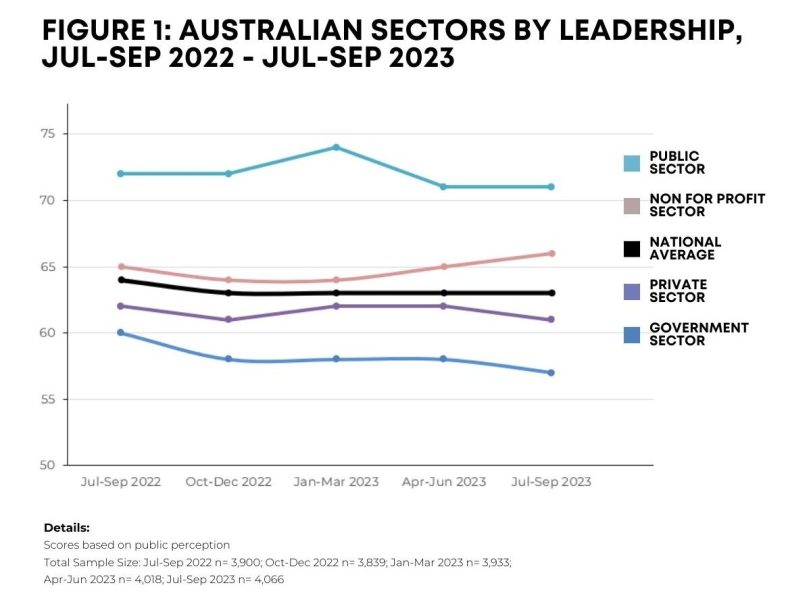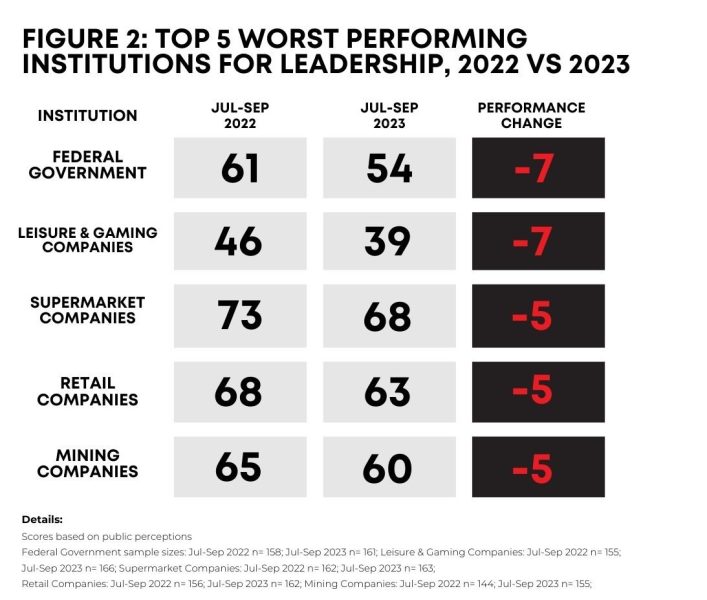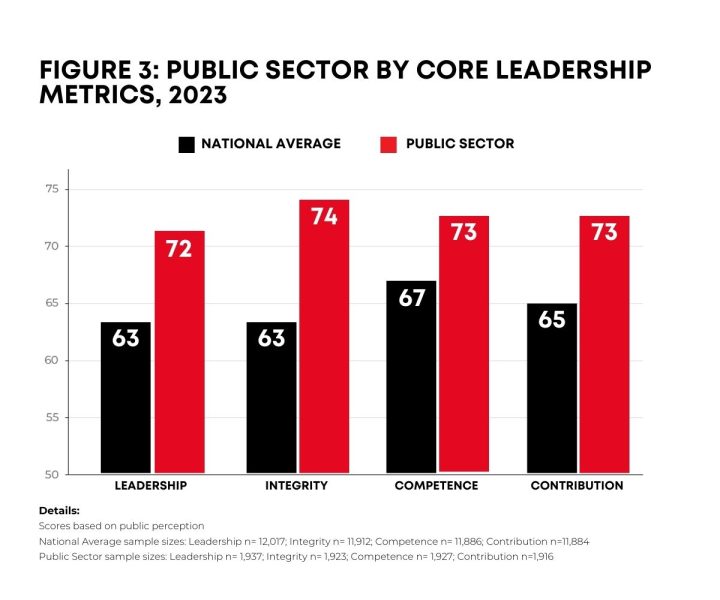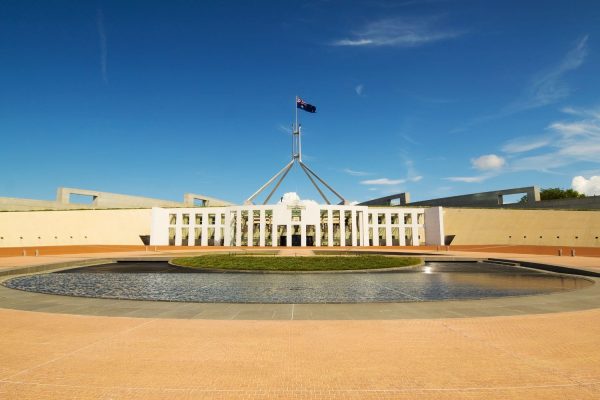The end of the year usually marks a time for rebirth and renewal, and the Australian public were certainly hopeful of that this time last year. With a new federal government in power and the economy rebounding post-COVID, the start of 2023 appeared promising. But those hoping for an improvement in Australian leadership were, unfortunately, let down this year. Our data shows that leadership perceptions in Australia declined in 2023, with a failed Voice To Parliament referendum, five interest rate rises and numerous big business integrity scandals all likely playing a part.
As Australians manage tightened budget and juggle work, busy families and their own personal lives, they appear to be increasingly dissatisfied with the leadership of our government and private sector leaders, who aren’t doing enough to demonstrate the benefits they are generating for Australian society. Only by backing up media releases and election promises with meaningful action will these perceptions change, with Australians wanting leadership that delivers for the greater good while operating with integrity.
In this article we’ll take a look at the main drivers of this decline, the institutions that need to improve in 2024 and why integrity issues are at the core of any perceived improvement in Australian leadership.
The Sectors Hurting Perceptions Of Australian Leadership
Perceptions of leadership peaked in our data in mid-2022, right after the federal election and change in government. This time in 2022, like the New Year period, appeared to be a time for optimism, with a new government bringing hope for a change in how this institution operates. That hope was dashed however, with our latest data showing the leadership perceptions of both the government and overall leadership reaching their lowest levels, as highlighted by Figure 1 below.

The main cause of this decline was decreased perceptions of government integrity, with issues like the PwC consultant saga and ongoing immigration detention scandal likely playing a part. It’s difficult to overstate just how important the federal government’s performance is to leadership perceptions in Australia, with enough gravity to pull down both our national average metric and our government sector metric. This is compounded when scandals like the PwC consulting saga occur, effectively partnering up government and private sector leaders to form an integrity supercell.
As seen above in Figure 1, leadership perceptions across the private sector have dropped as well, now sitting a significant margin behind the national average and well below their non-for-profit and public sector counterparts. In a similar fashion to the government sector, there have been a number of private sector integrity issues that have come up this year, from retail price gouging to Qantas’ staffing and passenger compensation issues. These issues, while having their own independent effect on these individual organisations, can quickly combine together to have additional impacts at three levels: on the greater institution, their respective sectors and, as we are seeing, on overall perceptions of Australian leadership.
Institutions With Room For Improvement In 2024
Our data shows that a number of institutions had positive years in 2023, with telecommunications companies performing well, charities improving with financial pressures increasing and even banks and finance companies improving from lows in Jul-Sep 2022. Most institutions were down on perceptions in 2023 however, with the below institutions highlighted in Figure 2 below some of our worst performers.

The performance of the federal government and leisure & gaming companies is the least surprising, with government integrity issues consistently in the headlines and the gaming industry long-ranked as our worst performing institution for leadership. The other three institutions, all from the private sector, are more surprising, however.
Mining companies are seen as financially important despite their environmental impact on our index, but their once-strongest core metric, contribution, has slid significantly as more Australians weigh up that financial/environmental balance. Supermarkets and retail companies, both part of the price gouging inquiries, face their own integrity issues as they continue to make record-profits despite the inflationary pressures being faced by the public. The impact of poor leadership performance by these and similar private sector institutions on perceptions of overall leadership has been strong and will only continue to exacerbate the sense that we are not well served by our social institutions in the months ahead.
For these perceptions to turn around our private and government sector leaders need to be able to demonstrate real integrity to the Australian public. Too often we see institutions within these sectors attempting to take moral stands on high-profile issues, while showing disdain for transparency, ethics and even the law in some cases. To achieve this outcome our private and government sector leaders should look to their public sector counterparts, who are seen as operating with strong integrity while making important contributions to Australian society.
The Public Sector: Honest, Hard-Working and Delivering For Australians
Several public sector institutions have long been the highest rated institutions on our index, with the public rating the performance of our emergency services, public postal services and higher education provider highly. Obviously, these public institutions to do not have to operate with the burden of needing to generate a profit will ahead of an election. But, as seen below in Figure 3, they do an exceedingly good job in contributing to the health and wellbeing of Australian society while operating with integrity. Not only that, but public sector institutions are seen to be making these contributions competently, even more so than their non-profit and private sector counterparts.

The importance of being able to competently contribute to Australian society should not be lost on the private and government sectors, with both showcasing the ability to do so at various times on our survey data. But it is in the area of integrity that both have struggled with for so long, and which the public sector have performed well in and continue to do so, as highlighted by Figure 3 above.
Sitting 11 points clear of our national average, it is clear that the public believes our postal services, law enforcement and health care providers are able to do their jobs effectively while still maintaining high standards of public integrity. Being honest, trustworthy and responsible shouldn’t be as difficult as our private and government leaders seem to make it, and for leadership perceptions to change in this country they will need to make a new commitment in 2024.
If business leaders and state & federal politicians are able to make this commitment, then these perceptions will improve and with it an improvement in leadership for the greater good. As the world manages growing environmental, geopolitical and technological concerns, the need for this leadership is greater than ever, as Australia looks to further establish itself as a society committed to creating a better future.




